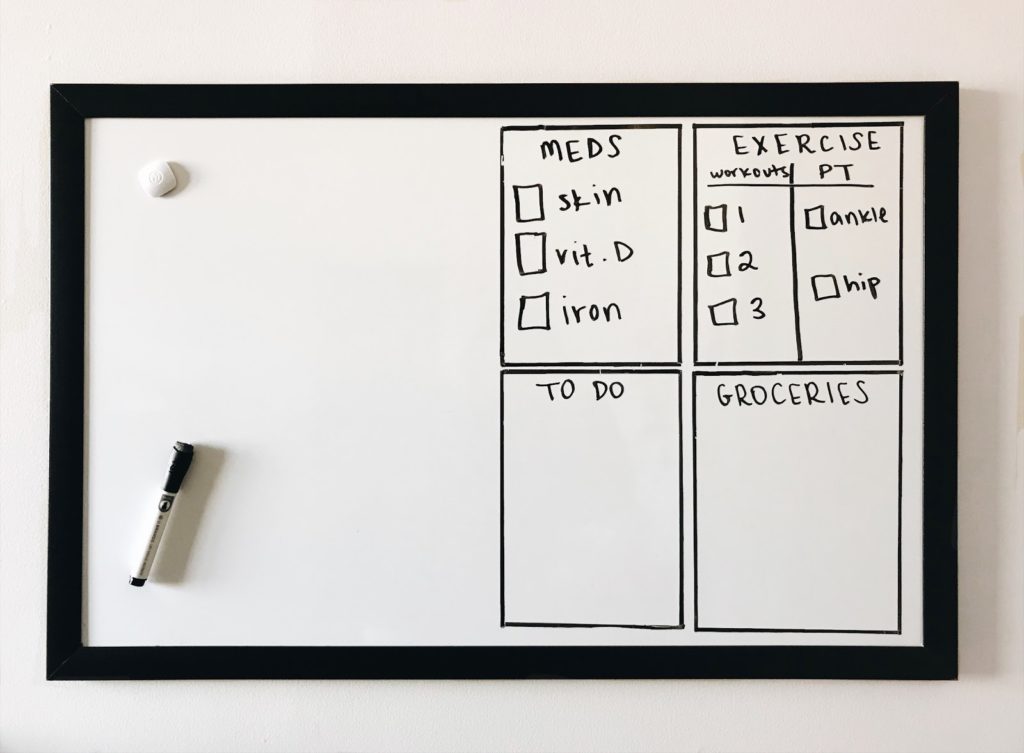The Unique Process That Helps Me Juggle My Health, School, & Home Life

As a blogger, I’m often asked for my tips and tricks for surviving grad school. My biggest piece of advice to fellow graduate students has always been to carry a small whiteboard everywhere. My own little (about 14” x 7”) whiteboard allows me to write out my notes and complete practice problems quickly and frequently without wasting any paper.
As a doctoral candidate now, I am recognizing the productivity benefits of having a larger whiteboard in my room to track my habits and tasks. The whiteboard hangs near my door and is one of the first things I see whenever I enter or leave my bedroom. I hung it up to serve a purpose similar to the smaller board — to work out practice problems and draw diagrams to aid my studying, but I have ended up finding it a great way to organize my thoughts and keep track of what I need to get done on a daily and weekly basis.
The whiteboard lists what I need to complete in a day and has space for me to check off what I’ve done, allowing me to better see what I have left to do before heading to bed. I’m here to share how I organize my lists and actually use them, unlike so many of the paper planners that I’ve had in the past.

My process:
1. I draw large rectangles (dividers, essentially) for each category that is important to me (“Meds,” “Physical Therapy Exercises,” “Workouts,” “To Do List”). I never put up a category just for the sake of having more things on the board; only the important, most frequently-needed, tasks go on it. I use my paper and Google planners for the rest. The whiteboard is best used for daily tasks that can be left up each night.
2. Next, I list tasks that are relevant to each category. For example, under “Meds,” I write in my vitamin D and iron supplements, and the medication I take for skin care. Those I take every day. I also have categories on the whiteboard for weekly checkoffs; under “Workouts,” I write “1, 2, 3” because my current goal is to work out three times per week. At this time, I don’t make the workouts specific (i.e. flexibility, strength, cardio), because I am not yet very consistent with exercise. If I happen to play in the snow with my friends or join in on a gym session with my classmates after lab, I count it as one of my three.
3. In addition to the categories that I leave up on the board from day to day, I have a section for to-do and grocery lists. I find that if my lists are in my planner, it is too easy for me to close and put the planner in my backpack, not to be pulled out until much later when I need to check my schedule. At that point, it might be too late to complete the more time-sensitive errands. Having it on the whiteboard in large, easily edited writing keeps the information more at the forefront of my mind.
*****
That’s the great thing about the whiteboard — I am forced to see my lists from pretty much any vantage point in my room. If I become tired at night and feel inclined to ignore my medications, which are very important to my health, the list stares down at me. Plus, you would probably agree with me that it feels great to check things off of a to-do list. Or, if you’re a student like me, to close all of the relevant internet tabs when you finally finish taking an exam.
The Financial Diet recently published a post introducing the idea of an anti-to-do list (AKA an accomplishment list AKA a “done” list). Once the tasks on my whiteboard are complete, and I can check them off, the board essentially functions as an accomplishments list as well, but tailored more to daily responsibilities. Combining the best of both worlds (to do and anti-to do lists), I’ve found that the whiteboard really works wonders for my productivity and overall feeling of achievement.
Need some more category ideas? Here are a few you can use:
- Meal Prep (per week)
- Breakfast
- Lunch
- Dinner
- Snack
- Water Intake (per day)
- 1 Liter
- 2 Liters
- 3 Liters
- Meditation (per week)
- 1
- 2
- 3
- 4
- 5
- Prayer (per day)
- 1
- 2
- 3
- 4
- 5
- Tidy the Room (per day)
- 10 minutes
- Brush & Floss (per day)
- 1
- 2
- Writing (per week)
- Mon
- Wed
- Fri
Happy planning!
Yusra is a writer, blogger, and fierce mental health advocate currently in her first year as a Doctor of Physical Therapy student. Yusra’s writing has been featured on sites such as New Grad Physical Therapy, the National Eating Disorders Association, Recovery Warriors, and The Mighty. Yusra hopes that through her writing she will be able to provide honest insight into life as a grad student while navigating the beautiful struggle that is mental health. Follow her journey on her blog and Instagram!
Image via Unsplash




